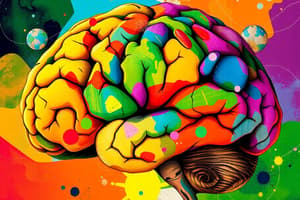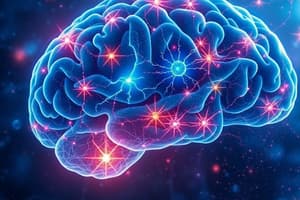Podcast
Questions and Answers
Which neurotransmitter is most directly associated with reducing pain and promoting well-being?
Which neurotransmitter is most directly associated with reducing pain and promoting well-being?
- Endorphins (correct)
- Substance P
- Glutamate
- Acetylcholine
A drug that mimics the effect of a neurotransmitter by activating its receptors is known as a(n):
A drug that mimics the effect of a neurotransmitter by activating its receptors is known as a(n):
- Reuptake inhibitor
- Agonist (correct)
- Depressant
- Antagonist
Which of these hormones is primarily responsible for regulating the sleep-wake cycle?
Which of these hormones is primarily responsible for regulating the sleep-wake cycle?
- Oxytocin
- Melatonin (correct)
- Ghrelin
- Leptin
What is the primary effect of GABA on neural activity?
What is the primary effect of GABA on neural activity?
An individual with a deficiency in dopamine might experience symptoms most closely associated with which of the following diseases?
An individual with a deficiency in dopamine might experience symptoms most closely associated with which of the following diseases?
What effect would a reuptake inhibitor have on neurotransmitter activity in the synapse?
What effect would a reuptake inhibitor have on neurotransmitter activity in the synapse?
Which neurotransmitter is primarily involved in muscle action, learning, and memory?
Which neurotransmitter is primarily involved in muscle action, learning, and memory?
How does the consumption of alcohol primarily affect neural processing?
How does the consumption of alcohol primarily affect neural processing?
Match the following neurotransmitters with their primary functions:
Match the following neurotransmitters with their primary functions:
Match the following hormones with their associated functions:
Match the following hormones with their associated functions:
Match the following types of psychoactive drugs with their effects:
Match the following types of psychoactive drugs with their effects:
Match the following neurotransmitters with their specific associations:
Match the following neurotransmitters with their specific associations:
Match the following neurotransmitter effects with their respective actions:
Match the following neurotransmitter effects with their respective actions:
Match the following depressive drugs with their effects:
Match the following depressive drugs with their effects:
Match the following neurotransmitter types with their classification:
Match the following neurotransmitter types with their classification:
Match the following neurotransmitters with their unique traits:
Match the following neurotransmitters with their unique traits:
Excitatory neurotransmitters prevent neural firing by hyperpolarizing the postsynaptic neuron.
Excitatory neurotransmitters prevent neural firing by hyperpolarizing the postsynaptic neuron.
Serotonin is a neurotransmitter involved in reward, motivation and movement.
Serotonin is a neurotransmitter involved in reward, motivation and movement.
Norepinephrine is involved in arousal, alertness and the 'fight-or-flight' response.
Norepinephrine is involved in arousal, alertness and the 'fight-or-flight' response.
GABA is the primary excitatory neurotransmitter in the brain.
GABA is the primary excitatory neurotransmitter in the brain.
Substance P is a neurotransmitter involved in the reduction of pain signals.
Substance P is a neurotransmitter involved in the reduction of pain signals.
Leptin is a hormone that stimulates hunger and promotes food intake.
Leptin is a hormone that stimulates hunger and promotes food intake.
Agonists block the effect of a neurotransmitter by inhibiting receptors.
Agonists block the effect of a neurotransmitter by inhibiting receptors.
Alcohol is classified as a stimulant that increases neural activity leading to heightened alertness and energy.
Alcohol is classified as a stimulant that increases neural activity leading to heightened alertness and energy.
Flashcards
Excitatory Neurotransmitters
Excitatory Neurotransmitters
Chemical messengers that promote neural firing by depolarizing the postsynaptic neuron.
Inhibitory Neurotransmitters
Inhibitory Neurotransmitters
Chemicals that prevent neural firing by hyperpolarizing the postsynaptic neuron.
Dopamine
Dopamine
A neurotransmitter involved in reward, motivation, and movement. Its dysregulation is linked to Parkinson’s disease and schizophrenia.
Serotonin
Serotonin
Signup and view all the flashcards
Hormones
Hormones
Signup and view all the flashcards
Adrenaline
Adrenaline
Signup and view all the flashcards
Agonists
Agonists
Signup and view all the flashcards
Antagonists
Antagonists
Signup and view all the flashcards
Endorphins
Endorphins
Signup and view all the flashcards
Substance P
Substance P
Signup and view all the flashcards
Leptin
Leptin
Signup and view all the flashcards
Ghrelin
Ghrelin
Signup and view all the flashcards
Glutamate
Glutamate
Signup and view all the flashcards
GABA
GABA
Signup and view all the flashcards
Stimulants
Stimulants
Signup and view all the flashcards
Depressants
Depressants
Signup and view all the flashcards
Signup and view all the flashcards
Study Notes
Neurotransmitters and Hormones
- Neurotransmitters: Chemical messengers within the nervous system, influencing communication between neurons.
- Excitatory Neurotransmitters: Chemicals that promote neural firing by depolarizing the postsynaptic neuron.
- Inhibitory Neurotransmitters: Chemicals that prevent neural firing by hyperpolarizing the postsynaptic neuron.
- Dopamine: A neurotransmitter involved in reward, motivation, and movement; its dysregulation is linked to Parkinson's disease and schizophrenia.
- Serotonin: A neurotransmitter regulating mood, sleep, appetite, and digestion; low levels are associated with depression.
- Norepinephrine: A neurotransmitter involved in arousal, alertness, and the "fight-or-flight" response.
- Glutamate: The primary excitatory neurotransmitter in the brain, crucial for learning and memory.
- GABA (Gamma-Aminobutyric Acid): The main inhibitory neurotransmitter in the brain, reducing neuronal excitability.
- Endorphins: Neurotransmitters that decrease pain perception and heighten feelings of well-being and pleasure.
- Substance P: A neurotransmitter involved in transmitting pain signals.
- Acetylcholine: A neurotransmitter vital for muscle action, learning, and memory.
Hormones
- Hormones: Chemical messengers produced by glands, regulating body functions and behaviors.
- Adrenaline: A hormone involved in the "fight-or-flight" response, increasing heart rate and energy.
- Leptin: A hormone regulating energy balance by suppressing hunger.
- Ghrelin: A hormone that stimulates hunger and promotes food intake.
- Melatonin: A hormone that regulates the sleep-wake cycle.
- Oxytocin: A hormone linked to bonding, social interactions, and childbirth.
Psychoactive Drugs and Their Effects
- Psychoactive Drugs: Substances altering perception, mood, or consciousness by influencing the nervous system.
- Agonists: Drugs that boost neurotransmitter effects by triggering receptors.
- Antagonists: Drugs that block neurotransmitter effects by hindering receptors.
- Reuptake Inhibitors: Prevent neurotransmitter reabsorption, increasing synaptic availability.
- Stimulants: Increase neural activity, causing heightened alertness and energy (e.g., caffeine, cocaine).
- Caffeine: Blocks adenosine receptors, promoting alertness.
- Cocaine: Increases dopamine, norepinephrine, and serotonin release, leading to euphoria and energy.
- Depressants: Decrease neural activity, resulting in relaxation and sedation (e.g., alcohol, benzodiazepines).
- Alcohol: Slows neural processing, impairing judgment, coordination, and memory.
- Hallucinogens: Distort sensory perception and produce hallucinations (e.g., LSD, mushrooms).
- Marijuana: Produces euphoria, altered perception; affects short-term memory and motor coordination.
- Opioids: Bind to opioid receptors, offering pain relief and euphoria (e.g., heroin, morphine).
- Heroin: Produces intense euphoria and is highly addictive.
Drug Effects and Consequences
- Tolerance: Increasing drug amounts needed for the same effect due to reduced sensitivity.
- Addiction: Compulsive drug use, loss of control over consumption.
- Withdrawal: Physical and psychological symptoms when stopping or reducing drug use.
Studying That Suits You
Use AI to generate personalized quizzes and flashcards to suit your learning preferences.
Description
Test your knowledge on neurotransmitters and their roles in the nervous system. This quiz covers key molecules such as dopamine, serotonin, and GABA, including their functions and associations with mental health. Explore the fascinating world of chemical messengers that impact mood, memory, and behavior.




